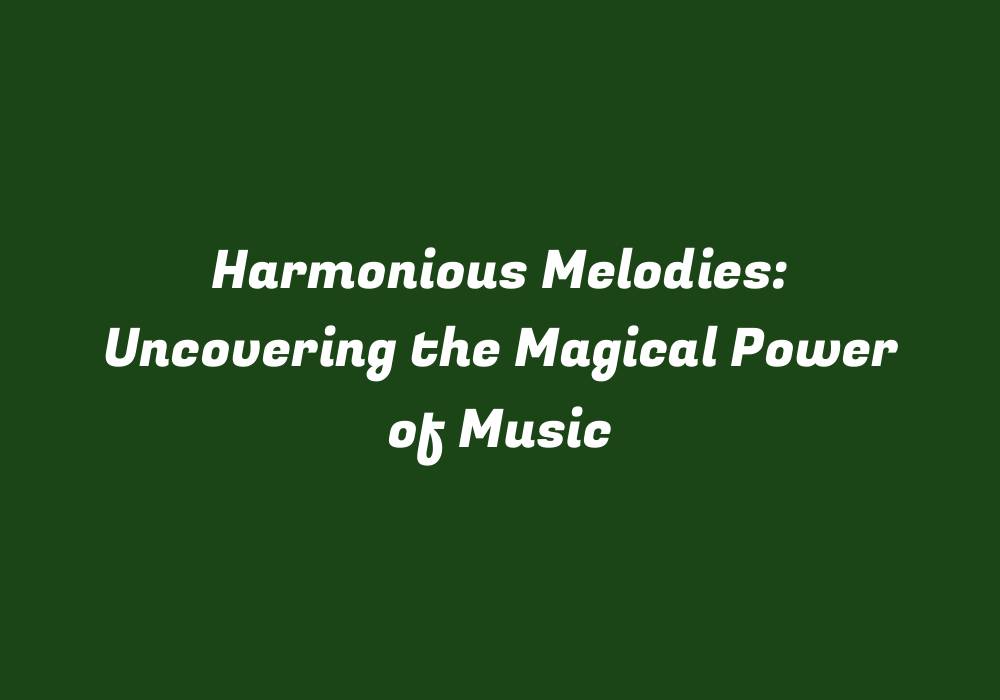Introduction
Music has been a prominent part of human life for thousands of years, influencing emotions, thoughts, and behavior in various ways. It has become an indispensable aspect of our lives, transcending cultural boundaries to touch the hearts of people from all walks of life. From soothing lullabies to rousing battle anthems, music plays a vital role in shaping our experiences. This article explores the magical power of harmonious melodies and dives into their profound effect on our emotions, psychology, and overall well-being.
Emotional Impact of Music: Healing Power
Music holds remarkable therapeutic value, providing solace and comfort during difficult times. It is often used as a tool in various healing modalities such as music therapy, where trained therapists use musical interventions to achieve non-pharmacological goals for physical, emotional, cognitive, or social needs. Music has the unique ability to evoke emotions, enabling individuals to express themselves and process their feelings more effectively.
The psychological benefits of music are vast, extending from improved mood regulation to stress reduction. Research has demonstrated that exposure to calming melodies can reduce anxiety levels in both adults and children, providing a soothing environment for personal reflection and growth. Moreover, listening to music with positive emotions can foster optimism, boost self-esteem, and provide comfort during times of grief or sorrow.
Psychological Benefits: Memory Retention & Cognitive Enhancement
Music has also been found to play a significant role in improving memory retention and cognitive functions. Numerous studies have shown that engaging with music can enhance verbal recall abilities, especially for individuals with mild forms of Alzheimer’s or dementia. Incorporating melodies into daily routines can help these individuals retain essential information more easily, enhancing their overall quality of life.
Furthermore, listening to instrumental music has been demonstrated to improve focus and concentration during complex tasks, making it a valuable tool for students studying or professionals working on challenging projects. Music is believed to stimulate both hemispheres of the brain simultaneously, fostering an enhanced level of cognitive function and creativity in various activities.
Physical Benefits: Stress Relief & Pain Management
Beyond psychological benefits, music has also been linked to physiological improvements such as reduced stress levels and improved pain management. It can help regulate the autonomic nervous system, lowering blood pressure and heart rate while promoting relaxation and a sense of well-being.
In many cultures, music is used in ceremonial practices or for soothing patients undergoing medical procedures to reduce anxiety and improve coping mechanisms. Listening to calming melodies has been shown to decrease pain perception in individuals with chronic conditions such as arthritis, fibromyalgia, or migraines.
Influence on Social Interaction & Personal Development
Music plays a crucial role in social interaction and personal development, fostering a sense of belonging and identity among listeners. Sharing musical preferences can bring people together, promoting communication, trust, and empathy within relationships. Moreover, music education has been proven to develop valuable life skills such as discipline, creativity, and teamwork, while enhancing self-confidence and communication abilities in young learners.
Music also serves as a tool for personal reflection and self-discovery, allowing individuals to explore their emotions, values, and aspirations in ways that are often difficult to articulate through language alone. By listening to or creating music, people can delve into their inner worlds and gain new insights into themselves and their connections with others.
Conclusion
Music’s magical power transcends time and culture, uniting humanity in a shared experience of harmony and connection. As a powerful medium for emotional expression, healing, and personal growth, it has the capacity to enrich our lives in countless ways. By understanding and harnessing the unique effects of harmonious melodies on our emotions, psychology, and well-being, we can continue to appreciate music’s transformative potential and explore its vast possibilities for self-discovery and human connection.
